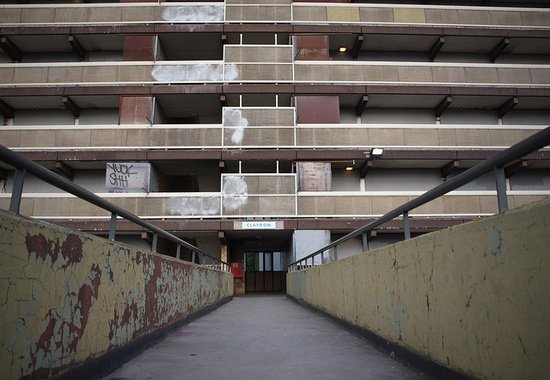Main author
Michael BrooksAdam Curtis - The Great British Housing Disaster
'Inquiry: The Great British Housing Disaster' - Adam Curtis
This 1984 'Inquiry' film was one of the first to be produced by the lauded BBC documentary film-maker Adam Curtis, popular for award-winning films such as 'The Century of the Self', 'The Power of Nightmares' and 'Bitter Lake'.
The documentary set out to investigate, not the well-chronicled social problems of 1960s council housing, but the origins of how they came to be built so poorly that thousands later needed to be demolished.
The film begins in 1963, with the Conservative Minster for Housing Keith Joseph setting an annual target of 400,000 new homes. It was this that kickstarted the 'numbers game', which prompted Labour to pledge, in their 1964 election-winning manifesto, that they would build 500,000 homes, and which continues to dominate political discourse about housebuilding today.
Labour's Housing Minister Richard Crossman introduced subsidies for contractors to adopt offsite manufacturing methods that were intended to allow local authorities to deliver housing from a factory production line.
Contractors such as Wimpey, Laing's, McAlpine's, and Costain, began to court council leaders like T. Dan Smith for public contracts, offering 'package deals' that would encompass all aspects of the project, taking advantage of the perceived complexity of the new building systems. The new approach was summed up by one council leader as, "build it quickly, think later."
The contractors began to build across the country with the mindset of building as cheaply and quickly as possible. The contractors' workforce was often unskilled labour on wages that were determined by how quickly work was completed, thereby tacitly encouraging the corner-cutting and time-saving that became endemic.
As this bad working practice began to lead to tenants' complaining about water penetration and poor insulation, the government set up a 'watchdog', the National Building Agency. This was tasked with inspecting building works, however, in reality its function was "hollow" according to the managing director Cleeve Barr who is interviewed in the film.
When structural engineers began investigating the problems, a picture emerged of wide-spread malpractice, inadequate 'knitting' of reinforcement, a high percentage of bolts and fixings missing, and so on. Often, block panels would arrive on site having been poorly manufactured in factories. The tower blocks were built like a house of cards, with no central frame which meant the whole strength rested on the bolts and fixings between individual blocks. In many cases, the buildings were on the verge of collapse.
Over the 10-year boom, a quarter-of-a-million flats were erected, housing up to 6 million council tenants who, in effect, were used as guinea pigs for testing new building systems that resulted in flats that were unfit for habitation.
Councils were faced with the dilemma of privately acknowledging many flats were unsafe, but, in the face of inadequate central government funding, having to justify in public their decision to keep council tenants in the buildings.
The documentary is a pointed and hard-hitting examination of a period in British construction that should serve as a stark warning when considering the contemporary issues of chronic housing and skills shortages.
Having something of a cult following, aficionados of Adam Curtis will enjoy this early glimpse of the trademark style seen in his later films, minus soundtrack collages and, most notably, his authoritative narration, which in this film is provided by David Jones.
You can watch the film on Youtube here:
[edit] Related articles on Designing Buildings Wiki
- Boom Cities: architect-planners and the politics of urban renewal in 1960s Britain.
- British post-war mass housing.
- Local authority.
- Modular buildings.
- Municipal Dreams: the rise and fall of council housing.
- Prefabrication.
- Right to buy.
- Ronan Point.
- Sink estate regeneration plans.
- Social housing.
- Urban decay.
Featured articles and news
UK Infrastructure: A 10 Year Strategy. In brief with reactions
With the National Infrastructure and Service Transformation Authority (NISTA).
Ebenezer Howard: inventor of the garden city. Book review.
The Grenfell Tower fire, eight years on
A time to pause and reflect as Dubai tower block fire reported just before anniversary.
Airtightness Topic Guide BSRIA TG 27/2025
Explaining the basics of airtightness, what it is, why it's important, when it's required and how it's carried out.
Construction contract awards hit lowest point of 2025
Plummeting for second consecutive month, intensifying concerns for housing and infrastructure goals.
Understanding Mental Health in the Built Environment 2025
Examining the state of mental health in construction, shedding light on levels of stress, anxiety and depression.
The benefits of engaging with insulation manufacturers
When considering ground floor constructions.
Lighting Industry endorses Blueprint for Electrification
The Lighting Industry Association fully supports the ECA Blueprint as a timely, urgent call to action.
BSRIA Sentinel Clerk of Works Training Case Study
Strengthening expertise to enhance service delivery with integrated cutting-edge industry knowledge.
Impact report from the Supply Chain Sustainability School
Free sustainability skills, training and support delivered to thousands of UK companies to help cut carbon.
The Building Safety Forum at the Installershow 2025
With speakers confirmed for 24 June as part of Building Safety Week.
The UK’s largest air pollution campaign.
Future Homes Standard, now includes solar, but what else?
Will the new standard, due to in the Autumn, go far enough in terms of performance ?
BSRIA Briefing: Cleaner Air, Better tomorrow
A look back at issues relating to inside and outside air quality, discussed during the BSRIA briefing in 2023.
Restoring Abbotsford's hothouse
Bringing the writer Walter Scott's garden to life.
Reflections on the spending review with CIAT.
Retired firefighter cycles world to raise Grenfell funds
Leaving on 14 June 2025 Stephen will raise money for youth and schools through the Grenfell Foundation.
Key points for construction at a glance with industry reactions.


























